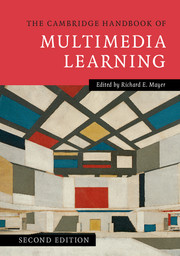Book contents
- The Cambridge Handbook of Multimedia Learning
- The Cambridge Handbook of Multimedia Learning
- Copyright page
- Contents
- Contributors
- Preface
- Acknowledgments
- 1 Introduction to Multimedia Learning
- Part I Theoretical Foundations
- Part II Basic Principles of Multimedia Learning
- Part III Advanced Principles of Multimedia Learning
- Part IV Multimedia Learning of Cognitive Processes
- Part V Multimedia Learning in Advanced Computer-Based Contexts
- 29 Multimedia Learning with Intelligent Tutoring Systems
- 30 Multimedia Learning with Simulations and Microworlds
- 31 Multimedia Learning with Computer Games
- 32 Multimedia Learning with Video
- 33 Multimedia Learning from Multiple Documents
- 34 Multimedia Learning in e-Courses
- Author Index
- Subject Index
33 - Multimedia Learning from Multiple Documents
from Part V - Multimedia Learning in Advanced Computer-Based Contexts
Published online by Cambridge University Press: 05 August 2014
- The Cambridge Handbook of Multimedia Learning
- The Cambridge Handbook of Multimedia Learning
- Copyright page
- Contents
- Contributors
- Preface
- Acknowledgments
- 1 Introduction to Multimedia Learning
- Part I Theoretical Foundations
- Part II Basic Principles of Multimedia Learning
- Part III Advanced Principles of Multimedia Learning
- Part IV Multimedia Learning of Cognitive Processes
- Part V Multimedia Learning in Advanced Computer-Based Contexts
- 29 Multimedia Learning with Intelligent Tutoring Systems
- 30 Multimedia Learning with Simulations and Microworlds
- 31 Multimedia Learning with Computer Games
- 32 Multimedia Learning with Video
- 33 Multimedia Learning from Multiple Documents
- 34 Multimedia Learning in e-Courses
- Author Index
- Subject Index
Summary
This chapter examines learning from multiple documents, that is, the construction of new knowledge, beliefs or opinions from more than a single source of information. First, we introduce the specific discourse processes that come into play when multiple-source documents are considered, as opposed to single-source texts or multimedia documents. We focus on the definition and role of sources, as well as on the semantic and rhetorical relationships at an intertextual level. Then we examine learning from multiple documents from a cognitive standpoint. We define two core principles: the sourcing principle and the multiple-document integration principle. Finally, we examine some implications of these principles for a general theory of text-based learning and for instructional practice throughout primary, secondary and higher education curricula.
- Type
- Chapter
- Information
- The Cambridge Handbook of Multimedia Learning , pp. 813 - 841Publisher: Cambridge University PressPrint publication year: 2014
- 22
- Cited by

